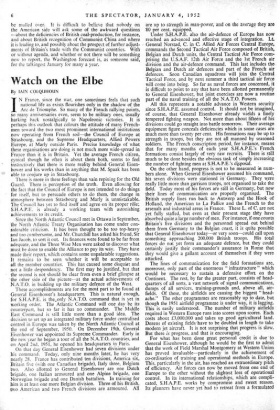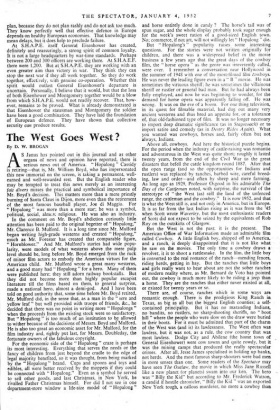Watch on the Elbe
ByIAIN COLQUHOUN
IN France, since the war, one sometimes feels that such national life as exists flourishes only in the shadow of the Arc de Triomphe. So many of the French rallying points, so many anniversaries even, seem to be military ones, usually harking back nostalgically to Napoleonic victories. It is perhaps this outlook that colours the attitude of many French- men toward the two most prominent international institutions now operating from French soil—the Council of Europe at Strasbourg, and the Supreme Headquarters; Allied Powers Europe, at Marly outside Paris. Precise knowledge of what these organisations are doing is not much more wide-spread in France than it is in Britain. Yet the average French citizen, cynical though he often is about them both, seems to feel instinctively that there is more reality behind General Eisen- hower and his works than in anything that M. Spaak has been 4,19 able to conjure up in Strasbourg.
There is more in these feelings than vain repining for the Old Guard. There is perception of the truth. Even allowing for the fact that the Council of Europe is not intended to do things for itself, but to persuade others to do them, the change in atmosphere between Strasbourg and Marly is unmistakable. The Council has yet to find itself and agree on its proper role; S.H.A.P.E. is already a working team with astonishing achievements to its credit.
Since the North Atlantic Council met in Ottawa in September, the North Atlantic Treaty Organisation has come under con- siderable criticism. It has been thought to be too top-heavy and too cumbersome, and Mr. Churchill has asked his friend, Sir Ian Jacob, to sort it out. Its finances were found to be far from adequate, and the Three Wise Men were asked to discover what must be done to enable the Alliance to pay its way. They have made their report, which contains some unpalatable suggestions. It remains to be seen whether it will be acceptable to all the member countries. This has caused some disquiet and not a little despondency. The first may be justified, but that ' the second is not should be clear from even a brief glimpse at - the other side of the picture—at the actual achievements of N.A.T.O. in building up the military defence of the West. These accomplishments are for the most part to be found at General Eisenhower's headquarters. This is natural enough, for S.H.A.P.E. is the.only N.A.T.O. command that is yet in working order. The Atlantic Command will one day be its counterpart, but so far it has no commander. The Middle East Command is still little more than a good idea. The decision to set up an integrated military force under centralised control in Europe was taken by the North Atlantic Council at the end of September, 1950. On December 19th, General Eisenhower was appointed its Supreme Commander. Early in the new year he began a tour of all the N.A.T.O. countries, and on April 2nd, 1951, he opened his headquarters in Paris. On that day General Eisenhower had seven divisions under his command. Today, only nine months later, he has very nearly 28. France has contributed ten divisions, America six, Britain five (with one Canadian brigade), Italy three, Belgium two. Also allotted to General Eisenhower are one Dutch brigade, one Italian armoured and one Alpine brigade, one Norwegian brigade and one Danish battalion. In training for him is at least one more Belgian division. Three of his British, two American and two French divisions are armoured. All are up to strength in man-power, and on the average they are 80 per cent. equipped.
Under S.H.A.P.E. also the air-defence of Europe has now reached an adyanced and effective stage of integration. Lt. - General Norstad, C. in C. Allied Air Forces Central Europe, commands the Second Tactical Air Force composed of British, Belgian and Dutch units, the Central Tactical Air Force com- prising the U.S.A.F. 12th Air Force and the 1st French air division and the air-defence command. This last includes the- Belgian and Dutch air defences and part of the French air defences. Soon Canadian squadrons will join the Central Tactical Force, and by next summer a third tactical air force will come into being. So far as naval forces are concerned, it is difficult to point to any that have been allotted permanently to General Eisenhower, but joint exercises are now a routine part of the naval training of all the N.A.T.O. Powers.
All this represents a notable advance in Western security since S.H.A.P.E. assumed control. It should not be imagined, of course, that General Eisenhower already wields a finely tempered fighting weapon. Not more than about fifteen of his divisions could go straight into battle tomorrow. Their average equipment figure conceals deficiencies which in some cases are much more than twenty per cent. His formations may be up to strength in troops, but they are not all manned by seasoned soldiers. The French conscription period, for instance, means that for many months of each year S.H.A.P.E.'s French formations consist largely of very raw recruits. There is still much to be done besides the obvious task of simply increasing the number of fighting men at S.H.A.P.E.'s cli,sposal. - On the other hand, progress is not to be measured in num- bers alone. When General Eisenhower assumed his command, his seven divisions were stationed in—Germany. They were really little more than garrison troops, not organised to take the field. Today most of his forces are still in Germany, but now their lines of communication are properly organised. The British supply lines run back to Antwerp and the Hook of Holland, the American to La Pallice and the French to the arsenals and industrial areas in France. These L. of C. are not yet fully staffed, but even at their present stage they have absorbed quite a large-number of men. For instance, if one counts Britain's five divisions and the personnel spread out behind them from Germany to the Belgian coast, it is quite possible that General Eisenhower today—or very soon—could call upon something approaching 200,000 British troops. His total forces do not yet form an adequate defence, but they could certainly justify their commander'S assurance in Rome that they would give a gallant account of themselves if they were attacked.
The lines of communication for the field formations are, moreover, only part of the enormous " infrastructure " which would be necessary to sustain a defensive effort on the Continent. The rest, by far the greater part, consists of head- quarters of all sorts, a vast network of signal communications, dumps of all services, training-grounds and, above all, air- fields. Of these, the airfields are causing the biggest " head- ache." The other programmes are reasonably up to date, but though the 1951 airfield programme is under way, it is lagging. This is easily understood. The number of military airfields required in Western Europe runs into scores upon scores. Each costs about £3,000,000 and takes up good agricultural land. Dozens of existing fields' have to be doubled in length to take modern jet aircraft. It is not surprising that progress is slow. But there is progress, and that is encouraging.
For what has been done great personal credit is due ' to General Eisenhower, although he would be the first to admit that the work of Field Marshal Montgomery at Western Union has proved invaluable—particularly in the achievement of co-ordination of training and operational methods in_Europe. This, particularly in the air, has reached an extraordinary pitch of efficiency. Air forces can now be moved from one end of Europe to the other without the slightest loss of operational control. In its international relationships, which are compli- cated, S.H.A.P.E. works by compromise and sweet reason. Its planners have never yet had to retreat from a formulated
plan, because they do not plan rashly and do not ask too much. They know perfectly well that effective defence in Europe depends on healthy European economies. That knowledge may mean delays, but it does help to preclude failure.
At S.H.A.P.E. itself General Eisenhower has created, definitely and reassuringly, a strong spirit of common loyalty. It is not a large headquarters by war-time standards. Perhaps between 200 and 300 officers are working there. At S.H.A.E.F. there were 1,200. But at S.H.A.P.E. they are working with an even greater aim than victory in war. They think they can stop the next war if they all work together. So they do work together, effectively, with genuine co-operation. Whether this spirit would outlast General Eisenhower's departure is uncertain. Personally, I believe that it would, but that the loss of both Eisenhower and Montgomery together would be a blow from which S.H.A.P.E. would not readily recover. That, how- ever, remains to be proved. What is already demonstrated is that Eisenhower the statesman and Montgomery the soldier have been a good combination. They have laid the foundation of European defence. They have shown that collective security can produce results.







































 Previous page
Previous page